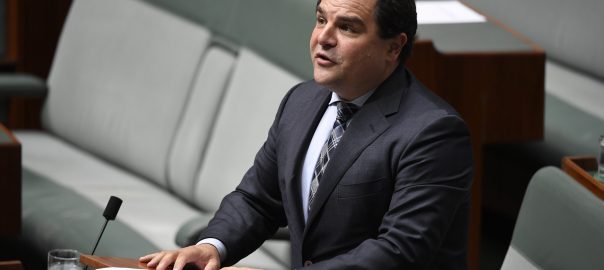Family Assistance Legislation Amendment (Cheaper Child Care) Bill 2022

House of Representatives
HANSARD
Wednesday 26 October 2022
Family Assistance Legislation Amendment (Cheaper Child Care) Bill 2022
Mr PASIN (Barker): The reality is that our party and the coalition support more affordable child care, but we also support more accessible child care.
I will leave for others commentary about what this $4.5 billion will do in relation to the cost of child care, and I could wax lyrical about what happened last time when those opposite were in charge of the Treasury benches and the price of child care and how it billowed out of control. But, rather than do that, I want to address the challenges that people in my electorate are facing. A report earlier this year from the Mitchell Institute showed that around one-third of Australian families—nine million Australians—live in a childcare desert. You might ask: ‘A childcare desert? What could that be?’ It’s been described as a place where there’s one childcare place for every three children seeking a place.
In my electorate, the Mitchell Institute report indicated that the Limestone Coast had 4.93 children per place—a childcare desert. The Murray-Mallee region in South Australia had 4.7 children per place—a childcare desert. In Barossa, a place that people in this place could perhaps incorrectly assume is a necessarily affluent area, had 3.3 children per place—a childcare desert. This matters, because these are places in my electorate and all across the country where, whilst the affordability question is important, the issue for them is access. No amount of money allows a young mum or a young father to get back into the workforce, because child care is simply not available. I want to pause and tell the House that, in my electorate, there are some services in some of these deserts—mobile child care. It is child care out of the boot of a car.
Mr Burnell interjecting—
Mr PASIN: I will take the interjection from the member for Spence. It’s almost as if I’d asked for it. The member said, ‘What have you done over the last nine years?’ For the benefit of the member for Spence, let’s run through it. Together with the community of Karoonda East Murray, we purposed drought funding to build—guess what? A childcare centre. In the community of Lameroo, together with my support and the policies of the previous coalition government, guess what we built. A childcare centre. Then we have the community of Pinnaroo. As a proud South Australian, the member for Spence should visit some of these communities. They are not far from where he lives. Guess what we built in Pinnaroo. A childcare centre.
But I don’t want to talk about those successes. I actually want to talk about the Kingston community in the south-east of South Australia. There are a couple of Kingstons in my electorate: there’s Kingston on Murray and Kingston South East, the home of Larry the lobster. I can see the member for Spence nodding; I think he wants to come for a holiday in the south-east. I’ll host him. But I really need to tell the House about the Kingston South East community and in particular the Kingston Early Learning and Childcare Services Working Group. This is a group of women—yes, gentlemen, they’re all women—who got together in Kingston because their area was a desert. They wanted to get back in the workforce—nurses, farmers, administrators and otherwise—but they couldn’t, so they began a campaign to get child care for Kingston. I’m so proud of these women because, while many of their children are now in high school, they kept fighting, not for their own personal interests but for their broader community.
In the lead-up to the last election, through the Capital Grants Program, which you might realise was scrapped in last night’s budget, we committed $1.8 million for a purpose built childcare centre in Kingston. Now, the member for Spence and I can agree on some things; I think we’d agree on more than many might think. But I want to give a shout-out to the former shadow minister, the member for Kingston, because during that campaign I contacted her and said: ‘Look, we’re going to make this commitment. Wouldn’t it be great if it was matched?’ And in fact it was matched, and this morning on local radio in South Australia Dr Anne Aly confirmed that funding. That was, for the benefit of the member for Spence, the member for Barker bringing the then opposition, kicking and screaming, to that outcome.
I’m pleased because we’re here to address affordability and accessibility. The problem with this bill, with respect, is that it does nothing about accessibility. It provides $4.5 billion, more money than you can fly a rocket ship over, but it doesn’t buy one additional place. It doesn’t train one additional early childhood educator. I don’t want you to take my word for it; I want you to hear directly from those outstanding women from the Kingston South East Early Learning and Childcare Services Working Group, who recently addressed a Senate committee:
We have a very small rural care service … where demand far exceeds supply. This issue is all too common in rural areas.
They said this issue was ‘far reaching’ and had affected their community for 40 years.
The mission of our working group is for all children in the Kingston area to have equal access to early learning and childcare opportunities—
hardly putting the man on the moon.
This shortage of early learning opportunities has really impacted our community in a negative manner for the past 40 years.
We talk about the gap. There are lots of gaps. Childcare deserts are most likely to occur, they say, in small towns with populations under 2,000 people.
The bill refers to the right to work, the right to education and the right to equality. If this is true then why does our geographical location disadvantage us so much?
You see, this is the point. This bill is about what postcode you live in. If you live in a metropolitan postcode and you earn a joint income of under $520-odd thousand, you will get access to cheaper child care. As I said at the beginning, we think cheaper child care for 1.2 million Australians is a great thing. But it’s got to sit hand in glove with programs and government policy to provide accessibility in these deserts.
They go on, as I have, to say ‘Cheaper child care is welcome and we support this element of the bill.’ Have a think about how gracious these Australians are. They have been without sufficient child care for 40 years, but they’re still happy for their fellow Australians to have access to cheaper child care. However, reform is needed to prevent market failure in rural and disadvantaged areas. State and federal governments must co-ordinate and implement a universal strategic approach to improving access to child care in regional areas. If those opposite are looking to develop a policy around access to early age education in this country, they would do well to get in the car, drive to Kingston, take a photo out the front of Larry the lobster, then sit down with the women of the Kingston SE Early Learning and Childcare Services Working Group. Because they lived it. They get it. Quite frankly, those opposite, if they think they have solved the childcare quandary in this country with this bill, they have only to speak to them to understand how far they are from the mark.








